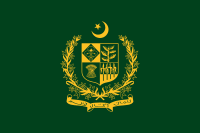Chief Executive Officer (Pakistan)
| Prime Minister of the Islamic Republic of Pakistan وزیر اعظم |
|
|---|---|

Standard of the Prime Minister of Pakistan
|
|
| Style |
His Excellency (diplomatic) Mr. Prime Minister (informal) Honourable Prime Minister (formal) |
| Member of | |
| Reports to | President |
| Residence | |
| Seat | Islamabad |
| Appointer |
ECP: by a Convention that is held in the National Assembly, based on appointee's ability to command confidence among the majority of the members. |
| Term length | As long as the confidence, and the membership, of the assembly is enjoyed. |
| Inaugural holder |
Liaquat Ali Khan (1947–1951) |
| Formation | 14 August 1947 |
| Website | www.pmo.gov.pk/ |
The Prime Minister of Pakistan (Urdu: وَزِیرِ اَعظَم — Wazīr-ē Aʿẓam, Urdu pronunciation: [ʋəˈziːr-ˌeː ˈɑː.zəm]; lit. "Grand Vizier"), is the head of government of Pakistan and designated as the "chief executive of the Republic". The Prime Minister leads the executive branch of the government, oversees the economic growth, leads the National Assembly, heads the Council of Common Interests as well as the Cabinet, and is vested with the command authority over the nuclear arsenals.
This position places its holder in leadership of the nation and in control over all matters of internal and foreign policy. The last holder of this position was Nawaz Sharif who was recently disqualified by the Supreme Court. He was replaced by interim Prime Minister Shahid Khaqan Abbasi. The Prime Minister is elected by the members of the National Assembly and therefore is usually the leader of the majority party in the parliament. The Constitution of Pakistan vests the executive powers in the Prime Minister, who is responsible for appointing the Cabinet as well as running the executive branch, taking and authorising executive decisions, appointments and recommendations that require executive confirmation of the Prime Minister.
...
Wikipedia

